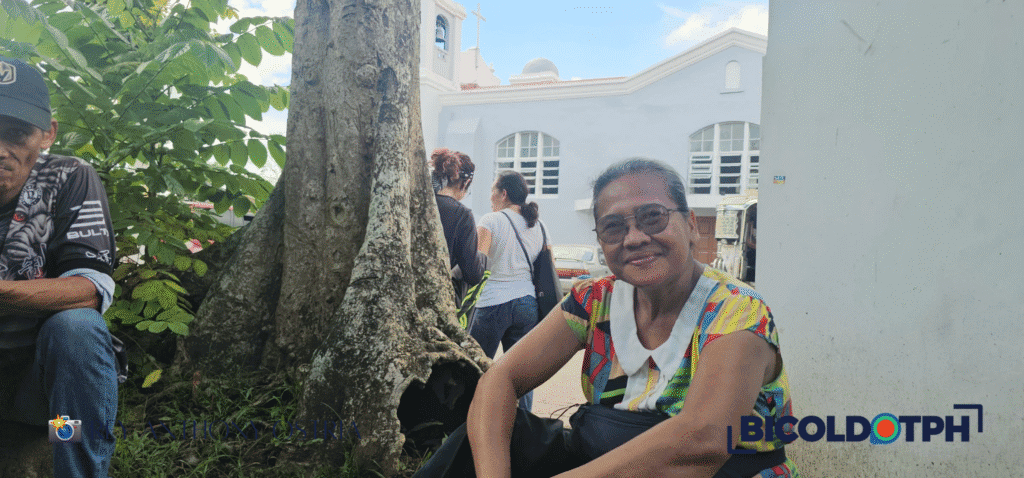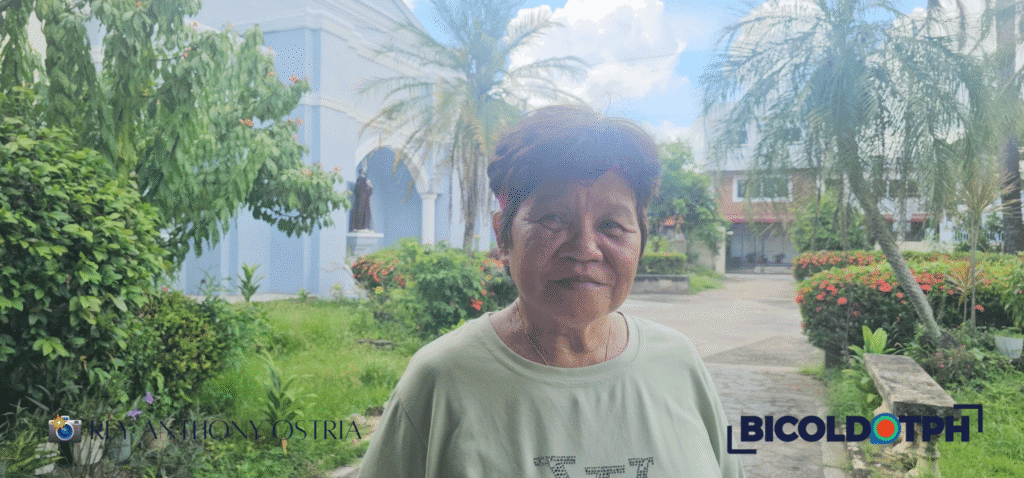Images of the Our Lady of Peñafrancia and Inay Maria ng Magnificat, both mounted on a blue truck blaring songs and prayers, guided the pilgrims through the streets of Camarines Sur. As they passed, locals paused and made the sign of the cross.
Some 350 farmers, fishers, women, indigenous peoples community members, youth, and workers joined a peace walk on Thursday, Sept. 18, to call for a lasting peace in the Bicol Region and throughout the Philippines.
Dubbed “Lakbay Dalangin 2025,” the walk was organized by the Bikol Pilgrims for Peace, a group calling for peaceful negotiations between the national government and the National Democratic Front of the Philippines (NDFP) and the release of political prisoners.
Among them was Diocese of San Carlos Bishop Gerardo “Gerry” Alminaza, who was, in the past, red-tagged for these exact same calls and as a co-convenor of the nationwide Pilgrims for Peace. The bishop from Negros Occidental was elected in July as the new chairman of the Catholic Bishops Conference of the Philippines’ (CBCP) Episcopal Commission on Social Action, Justice and Peace.

Bishop Alminaza, 66, said that he joined the peace walk as the Bicol pilgrims’ calls resonated with him especially since it is also a Jubilee Year.
“What saddens me is that our approach to peace is mostly militaristic. It’s as if someone has to win, someone has to lose, and weapons have to be used. But it doesn’t really address the root causes of why there’s violence in the country,” Bishop Alminaza told BicoldotPH while the group rested at St. Bartholomew the Apostle Parish Church in Baao town, also in Camarines Sur.
Together with Rev. Fr. Wilmer Joseph Tria, Bishop Alminaza celebrated the mass at the Parish and Archdiocesan Shrine of St. Anthony of Padua in Iriga City, where the pilgrims started the walk.
After stopping and having lunch in Baao, the group made their way to St. Rose of Lima Parish in Pili town for reflections on their goals.
Calls
One of the goals of the “Lakbay Dalangin 2025” is for just and lasting peace.
In the Bicol Region, there are 29 political prisoners as of this writing, according to Karapatan Bicol.
The alliance’s secretary general Nida Barcenas, 60, said that the 2025 Catholic Jubilee Year’s theme of “Pilgrims for Hope” closely aligns with their calls for justice for the marginalized sectors in the country.

“Returning the lands to farmers, the release of political prisoners… and debt forgiveness. All those calls are also the calls of the church,” Barcenas told BicoldotPH.
The first “Lakbay Dalangin” was in 2019, during the height of the war on drugs waged by then President Rodrigo Duterte, who is now in the custody of the International Criminal Court for “crimes against humanity of murder, torture and rape.”
Barcenas said that people were surprised to learn that they were making their way up to Naga City, which is about 39 kilometers from their starting point in Iriga City.
Some members of the peace walk were as young as 8 years old, while some were as old as 80 years old.
“This is what we see as an effective way to convey the demands and grievances of the victims of economic (uncertainty) here in the Philippines, victims of human rights violations, and those deprived of land,” Barcenas told BicoldotPH.
As the pilgrims walked, they were giving away flyers that explained their goals.
Bicolana Gabriela’s Jen Nagrampa, herself a former political prisoner, was also among the pilgrims.
“Our call here is for just and lasting peace. The Bikol Pilgrims for Peace share the same hopes as our devotees and, of course, Inang Peñafrancia in calling for peace and justice,” Nagrampa told BicoldotPH as she walked among other pilgrims.
The whole Bicol Region is in a month-long celebration of the Our Lady of Peñafrancia, the Bicol patroness.
She said that progressive groups and the Church must be united “especially now, when corruption and wrongdoing in our government have become so rampant and blatant.”
Church’s Teachings
Bishop Alminaza said that the teaching of the Church says that labor has primacy over capital, something that the Bicol Pilgrims for Peace were campaigning for.
He said that while talking with the farmers who do not own the land they are tilling, he learned that they divide their fruits of labor equally with the land owners—”half and half,” as they put it.
“But in truth, the land will bear no fruit without farmers, without labor. Capital remains capital unless someone works on it, which is why labor truly has primacy,” Bishop Alminaza told BicoldotPH. “So the one who does the labor should be given a bigger share.”
Emelia, 60 and vice president of Amihan Bicol from Ligao City, told BicoldotPH that they joined the peace walk to be a voice for farmers and farmers’ rights in the region.
She said that while some farmers get assistance from the government, it is still given selectively.
“It should be equal for all. If one prospers, everyone should prosper together,” Emelia said.

Bishop Alminaza said that the government has to address these issues for the benefit of the wider society.
“Politics, supposed to be, is the highest order of charity,” he said.
He also said that basic services in health, education, transportation, and energy should not be privatized.
“[Privatization] means that they are really prioritizing profit,” he said.
“It is also saddening because our leaders are products of Catholic schools, so we ask ourselves, ‘Where did we fall short?'”
Corruption Scandal
The scandals in the public works projects are not unknown to the pilgrims.
“With what we now know, if we just stay silent, it’s like we’re saying it’s okay with us. It requires a corresponding amount of indignation and anger—but it should still be peaceful and directed in the right way,” Bishop Alminaza said.
Nica Ombao, regional coordinator of Bicolana Gabriela, told BicoldotPH that accountability from the government is still lacking.
“We are with fellow Bicolanos affected by the oppressive system that we have. Many here are victims of ‘Kristine.’ We are with farmers who lost their income and had their harvests damaged by the storm, and poor urban residents who were flooded and continue to be affected by flooding,” she said.
Storm “Kristine” (internationally, “Trami”) was a severe tropical storm that left at least 29 dead in the Bicol Region in October 2024.
On Sunday, Sept. 21, the country will remember the atrocities of the Martial Law during the former dictator Ferdinand Marcos Sr.’s presidency. It will be 53 years since Marcos critics were tortured, detained, forcibly disappeared, raped, and killed during Martial Law.
On the same day, the Trillion Peso March is slated in Metro Manila amid allegations of corruption in flood control projects, some of which were either “ghost” or sub-standard projects. Protests are also planned in Naga City in Camarines Sur and Legazpi City in Albay on the same day.
Bishop Alminaza will be joining the Trillion Peso March while some of those who joined the Bikol Pilgrims for Peace expressed that they will be in the Bicol protests.
“While there is no justice, the demand for it must continue,” Bishop Alminaza said.
The pilgrims ended their walk on Thursday at the St. Raphael the Archangel Parish in Pili and will continue walking to the Minor Basilica and National Shrine of Our Lady of Peñafrancia in Naga City on Friday.
Bishop Alminaza said that on their way, he hopes that more people will be encouraged to ask questions.
“It feels like this is just the beginning, and I hope it can be sustained. I’m also glad that, somehow, many young people are taking it upon themselves. This means it’s a different kind of generation, and we cannot underestimate them,” he said.
